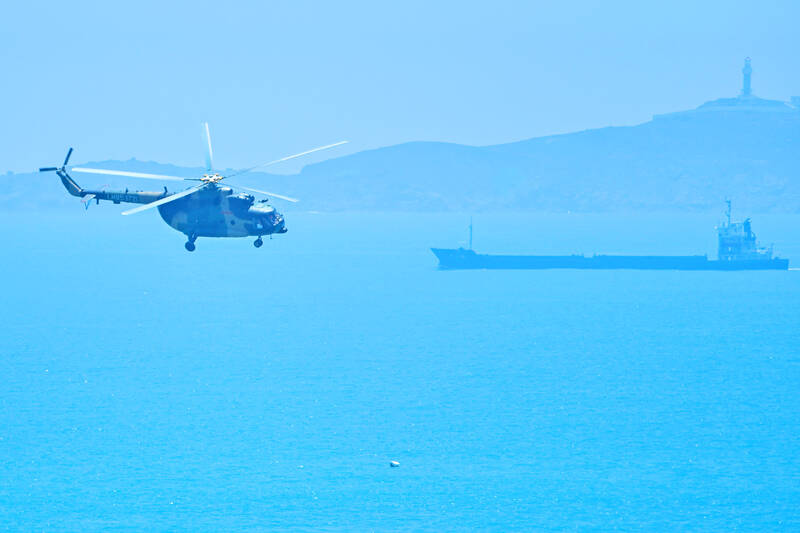China is aiming for domination of the Western Pacific, and preparing for the annexation of Taiwan, a military analyst in Taipei said yesterday, after China announced a military budget of 1.56 trillion yuan (US$225.83 billion) for this year.
The budget, announced yesterday at the 14th National People’s Congress in Beijing, represents a 7.2 percent increase from last year, and is 11 times that of Taiwan’s annual defense budget of NT$586.3 billion (US$19.14 billion).
Taiwan’s defense budget this year accounts for 2.4 percent of its GDP, and the focus of defense spending is on the development of domestically produced aircraft and naval vessels, the improvement of existing equipment, the replenishment of ammunition, the improvement of reserve forces, and the development of asymmetric combat capabilities, the Ministry of National Defense said.

Photo: AFP
The ministry is also focused on improving its drone fleet, which is aimed at managing incursions into Taiwan’s airspace by Chinese drones and other military aircraft, it said.
Institute of National Defense and Security Research director Su Tzu-yun (蘇紫雲) yesterday said that the government has been working to narrow the defense spending gap, and those efforts are reflected in this year’s budget.
China last year budgeted 16 times more for military spending than Taiwan, compared with 11 times more this year.
“However, Taiwan does not need to engage in an endless military spending race with China. What is important is the acceleration of the development of asymmetric combat capabilities, including precision munitions,” Su said.
“Taiwan can develop precise anti-ship and anti-aircraft missiles, which is a cost-effective way of coping with China’s large number of vessels and aircraft,” he said.
Whereas an air force jet costs China tens of millions of dollars, and a frigate costs an average of US$1 billion, Taiwan can produce precise anti-aircraft and anti-ship missiles for a per-unit cost of US$1 million, Su said.
“In asymmetric warfare, Taiwan can defend itself using fewer resources,” he said.
China’s plans for Taiwan are part of greater ambitions to break through the first island chain and become a major sea power that dominates the Western Pacific, which would severely affect the global economy and world security, he said.
National Taiwan University professor Chen Shih-min (陳世民) said the government should prioritize bolstering Taiwan’s ability to “deter war before war breaks out.”
“We must strive to make Beijing realize that if it attacks Taiwan, it will suffer unbearable losses and not dare start war lightly,” he said.

Alain Robert, known as the "French Spider-Man," praised Alex Honnold as exceptionally well-prepared after the US climber completed a free solo ascent of Taipei 101 yesterday. Robert said Honnold's ascent of the 508m-tall skyscraper in just more than one-and-a-half hours without using safety ropes or equipment was a remarkable achievement. "This is my life," he said in an interview conducted in French, adding that he liked the feeling of being "on the edge of danger." The 63-year-old Frenchman climbed Taipei 101 using ropes in December 2004, taking about four hours to reach the top. On a one-to-10 scale of difficulty, Robert said Taipei 101

Nipah virus infection is to be officially listed as a category 5 notifiable infectious disease in Taiwan in March, while clinical treatment guidelines are being formulated, the Centers for Disease Control (CDC) said yesterday. With Nipah infections being reported in other countries and considering its relatively high fatality rate, the centers on Jan. 16 announced that it would be listed as a notifiable infectious disease to bolster the nation’s systematic early warning system and increase public awareness, the CDC said. Bangladesh reported four fatal cases last year in separate districts, with three linked to raw date palm sap consumption, CDC Epidemic Intelligence

Taiwanese and US defense groups are collaborating to introduce deployable, semi-autonomous manufacturing systems for drones and components in a boost to the nation’s supply chain resilience. Taiwan’s G-Tech Optroelectronics Corp subsidiary GTOC and the US’ Aerkomm Inc on Friday announced an agreement with fellow US-based Firestorm Lab to adopt the latter’s xCell, a technology featuring 3D printers fitted in 6.1m container units. The systems enable aerial platforms and parts to be produced in high volumes from dispersed nodes capable of rapid redeployment, to minimize the risk of enemy strikes and to meet field requirements, they said. Firestorm chief technology officer Ian Muceus said

MORE FALL: An investigation into one of Xi’s key cronies, part of a broader ‘anti-corruption’ drive, indicates that he might have a deep distrust in the military, an expert said China’s latest military purge underscores systemic risks in its shift from collective leadership to sole rule under Chinese President Xi Jinping (習近平), and could disrupt its chain of command and military capabilities, a national security official said yesterday. If decisionmaking within the Chinese Communist Party has become “irrational” under one-man rule, the Taiwan Strait and the regional situation must be approached with extreme caution, given unforeseen risks, they added. The anonymous official made the remarks as China’s Central Military Commission Vice Chairman Zhang Youxia (張又俠) and Joint Staff Department Chief of Staff Liu Zhenli (劉振立) were reportedly being investigated for suspected “serious